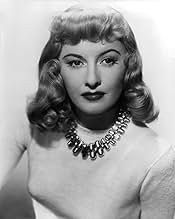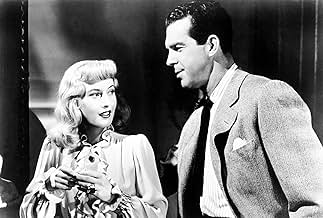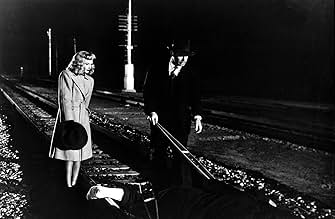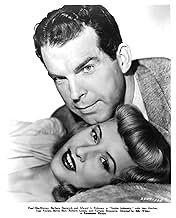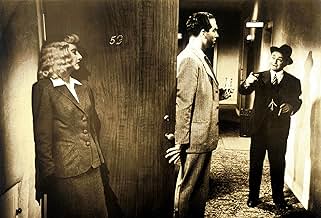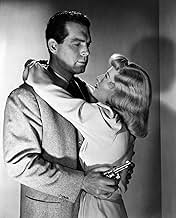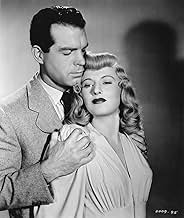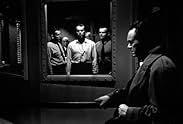Um agente de seguros se deixa convencer de um esquema de assassinato e fraude, o que desperta a suspeita de um investigador.Um agente de seguros se deixa convencer de um esquema de assassinato e fraude, o que desperta a suspeita de um investigador.Um agente de seguros se deixa convencer de um esquema de assassinato e fraude, o que desperta a suspeita de um investigador.
- Direção
- Roteiristas
- Artistas
- Indicado a 7 Oscars
- 5 vitórias e 9 indicações no total
Lev Abramov
- Stage Hand
- (não creditado)
James Adamson
- Pullman Porter
- (não creditado)
John Berry
- Bit Part
- (não creditado)
Raymond Chandler
- Man Reading Magazine Outside Keyes' Office
- (não creditado)
Edmund Cobb
- Train Conductor
- (não creditado)
Kernan Cripps
- Conductor
- (não creditado)
Betty Farrington
- Nettie - Dietrichsons' Maid
- (não creditado)
Bess Flowers
- Norton's Secretary
- (não creditado)
- Direção
- Roteiristas
- Elenco e equipe completos
- Produção, bilheteria e muito mais no IMDbPro
Resumo
Reviewers say 'Double Indemnity' is acclaimed for Billy Wilder's direction, standout performances by Fred MacMurray, Barbara Stanwyck, and Edward G. Robinson, and its pioneering film noir style. The intricate plot, dark themes, and exploration of human nature are often lauded. Voice-over narration, sharp dialogue, and unique cinematography heighten its suspense. Despite minor pacing issues and plot inconsistencies, its impact on the noir genre and cinema is significant. The lead characters' chemistry and moral complexities are noted for enhancing dramatic tension.
Avaliações em destaque
Vintage Noir Film with gritty interpretation , atmospheric settings , crackling dialogue throughout and powerhouse filmmaking . This Billy Wilder's first thriller is one of the finest Noir film ever made . A scheming wife (Barbara Stanwyck) lures an insurance salesman (Fred MacMurray , though Alan Ladd, George Raft, Brian Donlevy, James Cagney, Spencer Tracy, Gregory Peck, and Fredric March were all up for the leading role) into helping murder her husband and then declare it an accident . Both of whom concoct a twisted scheme to collect the benefits of a insurance policy . As the hubby's policy contains a clause that states that if the husband's death caused by a moving train the policy pays double face value . The investigator's boss (Edward G. Robinson) , not knowing his colleague is involved in it , suspects murder and sets out to prove it .
This first-rate and entertaining American classic Noir film draws its riveting tale and power from the interaction of finely drawn roles as well as drama , emotion and moody atmosphere . This classic mystery thriller follows James M Cain's book fairly closely otherwise . Twisted film Noir about murder , troubled relationships , treason , dark secrets , including an unforgettable dialog ; being based on the James M Cain's novel , which in turn was based on the true story of Ruth Snyder, the subject of a notorious 1920s murder trial , being screen-written by the prestigious Raymond Chandler and the same Billy Wilder . However , Billy Wilder and Raymond Chandler did not get along well while writing this film's script, a process that was apparently filled with arguments . As Billy Wilder didn't really get on with the famous novelist whose constant drinking irritated the director . It packs a good realization , an original script , haunting atmosphere , intriguing events ; for that reason madness and murder prevail . Fred MacMurray is superb as insurance salesman coerced into murder plot and Barbara Stanwick as predatory and alluring Femme Fatale is magnificent . Here his colleague Edward G Robinson is extraordinary and as cool as ever ; he plays as the astute and stubborn investigator , his scenes with Fred MacMurray are awesome and at their best . But Edward G. Robinson's initial reluctance to sign on largely stemmed from the fact he wasn't keen on being demoted to third lead . Good support cast formed by notorious secondaries such as Porter Hall , Tom Powers , Jean Heather , Byron Barr and Fortunio Bonanova . And Raymond Chandler's cameo , this marks the only film appearance of screenwriter and novelist Raymond Chandler .
Exciting as well as complex film , possessing a mysterious and fascinating blend of gripping thriller , serenity , baroque suspense in which especially stands out the portentous performances , evocative cinematography in black and white by John F. Seitz and thrilling musical score by the classic Miklos Rozsa . The motion picture was stunningly directed by the great Billy Wilder , as the American Film Institute ranked this as the #29 Greatest Movie of All Time . The film was nominated for 7 Academy Awards but lost out on the night to Going my way (1944) by Leo McCarey. It got a deep inspiration for other films , it is particularly obvious for ¨Body heat¨ by Lawrence Kasdan with William Hurt , Kathleen Turner and Richard Crenna . Remade for TV in 1954 by Buzz Kulik with Frank Lovejoy , Ray Collins and Laraine Day , and 1973 TV remake of the 1940s classic by Jack Smight with Richard Crenna , Samantha Eggar , and Robert Webber .
This first-rate and entertaining American classic Noir film draws its riveting tale and power from the interaction of finely drawn roles as well as drama , emotion and moody atmosphere . This classic mystery thriller follows James M Cain's book fairly closely otherwise . Twisted film Noir about murder , troubled relationships , treason , dark secrets , including an unforgettable dialog ; being based on the James M Cain's novel , which in turn was based on the true story of Ruth Snyder, the subject of a notorious 1920s murder trial , being screen-written by the prestigious Raymond Chandler and the same Billy Wilder . However , Billy Wilder and Raymond Chandler did not get along well while writing this film's script, a process that was apparently filled with arguments . As Billy Wilder didn't really get on with the famous novelist whose constant drinking irritated the director . It packs a good realization , an original script , haunting atmosphere , intriguing events ; for that reason madness and murder prevail . Fred MacMurray is superb as insurance salesman coerced into murder plot and Barbara Stanwick as predatory and alluring Femme Fatale is magnificent . Here his colleague Edward G Robinson is extraordinary and as cool as ever ; he plays as the astute and stubborn investigator , his scenes with Fred MacMurray are awesome and at their best . But Edward G. Robinson's initial reluctance to sign on largely stemmed from the fact he wasn't keen on being demoted to third lead . Good support cast formed by notorious secondaries such as Porter Hall , Tom Powers , Jean Heather , Byron Barr and Fortunio Bonanova . And Raymond Chandler's cameo , this marks the only film appearance of screenwriter and novelist Raymond Chandler .
Exciting as well as complex film , possessing a mysterious and fascinating blend of gripping thriller , serenity , baroque suspense in which especially stands out the portentous performances , evocative cinematography in black and white by John F. Seitz and thrilling musical score by the classic Miklos Rozsa . The motion picture was stunningly directed by the great Billy Wilder , as the American Film Institute ranked this as the #29 Greatest Movie of All Time . The film was nominated for 7 Academy Awards but lost out on the night to Going my way (1944) by Leo McCarey. It got a deep inspiration for other films , it is particularly obvious for ¨Body heat¨ by Lawrence Kasdan with William Hurt , Kathleen Turner and Richard Crenna . Remade for TV in 1954 by Buzz Kulik with Frank Lovejoy , Ray Collins and Laraine Day , and 1973 TV remake of the 1940s classic by Jack Smight with Richard Crenna , Samantha Eggar , and Robert Webber .
This is one of the best-liked classic films of all time and I am among that large group of fans as well.
Few movies have ever had dialog this entertaining.....at least the conversations between Barbara Stanwyck and Fred MacMurray. I think it's a big appeal to this movie, except to younger folks who look at it as "cheesy."
I read the book, Double Indemnity written by James Cain, and was surprised that the film's snappy dialog was not in it. This is one of the rare times when the movie was far better than the book. That's not a shock after you find out that literary giant Raymond Chandler and Hall Of Fame director Billy Wilder combined to write the screenplay,
For a murder/suspense story, there is very little action, almost none, yet there are no boring lulls. The three main actors - Stanwyck, MacMurray and Edward G. Robinson, are what make this so good.
MacMurray's narration is fun to hear as he tells the story in flashback, from the beginning by dictating into an old Dictaphone to his co-worker Robinson. The latter is almost mesmerizing in his performance, the way he delivers his lines. He can even make a speech about something as boring as insurance and still keep you riveted to the screen.
Stanwyck was no sex symbol (at least to me) but she looked great here in the most seductive of 1940s clothing and, like Robinson, has a distinctive voice and accent that keeps your attention.
This film was the inspiration for the 1980 movie, "Body Heat," starring William Hurt and Kathleen Turner. That, too, was a very, very good movie....but not many films are in the class of this one.
Few movies have ever had dialog this entertaining.....at least the conversations between Barbara Stanwyck and Fred MacMurray. I think it's a big appeal to this movie, except to younger folks who look at it as "cheesy."
I read the book, Double Indemnity written by James Cain, and was surprised that the film's snappy dialog was not in it. This is one of the rare times when the movie was far better than the book. That's not a shock after you find out that literary giant Raymond Chandler and Hall Of Fame director Billy Wilder combined to write the screenplay,
For a murder/suspense story, there is very little action, almost none, yet there are no boring lulls. The three main actors - Stanwyck, MacMurray and Edward G. Robinson, are what make this so good.
MacMurray's narration is fun to hear as he tells the story in flashback, from the beginning by dictating into an old Dictaphone to his co-worker Robinson. The latter is almost mesmerizing in his performance, the way he delivers his lines. He can even make a speech about something as boring as insurance and still keep you riveted to the screen.
Stanwyck was no sex symbol (at least to me) but she looked great here in the most seductive of 1940s clothing and, like Robinson, has a distinctive voice and accent that keeps your attention.
This film was the inspiration for the 1980 movie, "Body Heat," starring William Hurt and Kathleen Turner. That, too, was a very, very good movie....but not many films are in the class of this one.
I've now seen this movie 14 times in 25 years, at all times of the year, in all moods, sober or not etc - but always at night. I recorded my copy off TV in 1987 so I can only imagine what a remaster would do for it. With an atmosphere thick enough to cut with a knife it never fails to engross and enchant me, and although it's been dated for 40 years or more still seems relevant and watchable today. TV, answer phones, recordable CD/DVD, memory sticks and the internet have all come between us and yet I can still watch Fred MacMurray speaking into a Dictaphone without a qualm. Who wears a hat in California nowadays? Who buys beer whilst driving! Lift attendants have gone but I can still believe in Charlie working and laughing away in the garage past 11 at night.
Woman and man agree to murder woman's husband but on the way to the cemetery they face grilling by insurance company. I think everything has been said before on the IMDb - by those who think it's one of the best films ever made! To those who simply think the main problem is that it's dated I wish you could see the TV commercials that dug into DI back in '87 - what a hoot - and compare. I've just noticed the print TCM UK is showing in 2005 is lip-synced out, very wobbly Rosza music track, fading and ageing fast - worse than my 1987 video tape (maybe logically). They're supposed to be encouraging people to enjoy the classics but they won't do that with such inferior screening copies. Dear TCM UK, this is an impressive iconic film - it deserves a billion dollar remaster authorised by the Library of Congress, not repeatedly trotting out unimpressive cheap worn dupes to fill those 2 hour slots.
Everything about DI from the acting, production, direction, and music is superbly dignified and is as "close to perfection" as human beings are probably allowed to get with this form of Art - especially with the more limited technology at their disposal in '44. When most films from now are long forgotten and dated DI will still be getting re-runs on TV and art-house cinemas - God and remasters willing - that is the fact of it.
Fortunia Bonanova certainly was fortunate to have appeared in bit parts in 2 of the best films ever made - Citizen Kane the other.
Woman and man agree to murder woman's husband but on the way to the cemetery they face grilling by insurance company. I think everything has been said before on the IMDb - by those who think it's one of the best films ever made! To those who simply think the main problem is that it's dated I wish you could see the TV commercials that dug into DI back in '87 - what a hoot - and compare. I've just noticed the print TCM UK is showing in 2005 is lip-synced out, very wobbly Rosza music track, fading and ageing fast - worse than my 1987 video tape (maybe logically). They're supposed to be encouraging people to enjoy the classics but they won't do that with such inferior screening copies. Dear TCM UK, this is an impressive iconic film - it deserves a billion dollar remaster authorised by the Library of Congress, not repeatedly trotting out unimpressive cheap worn dupes to fill those 2 hour slots.
Everything about DI from the acting, production, direction, and music is superbly dignified and is as "close to perfection" as human beings are probably allowed to get with this form of Art - especially with the more limited technology at their disposal in '44. When most films from now are long forgotten and dated DI will still be getting re-runs on TV and art-house cinemas - God and remasters willing - that is the fact of it.
Fortunia Bonanova certainly was fortunate to have appeared in bit parts in 2 of the best films ever made - Citizen Kane the other.
This is one of the best films of all time, not necessarily because of its story but because of the acting, direction, cinematography, lighting, and just the way that the story itself was told. At the time the film was released, the idea of revealing who the killer was in the opening scene was virtually unheard of, but it ended up being very effective because it allowed the audience to concentrate more on other elements of the film, which was the goal of Billy Wilder, the director. Instead of trying to figure out who the perpetrator was, there is more emphasis on how the crime was pulled off, what mistakes were made during the murder, who betrayed who, how close Barton Keyes (the insurance investigator) was getting to solving the case, and, probably most importantly, what kind of person Walter Neff is and whether or not sympathy should be felt toward him.
Barbara Stanwyck, in one of the most remembered performances of her extensive career, represents (with nearly flawless ease) the cold and ruthless manipulator who has no difficulty in ruining other people's lives in various ways (including death, if necessary) in order to get what she wants. Known in the film community as the `femme fatale,' this is someone who uses her sexual prowess, seductiveness, and emotional detachment to drag an unsuspecting person (generally an interested man) into a scheme from which she is expected to benefit heavily and he is most likely headed for destruction. In these types of films, the man often either finds his life in ruins or ends up dead, as is often (but not always) also the case with the fate of the femme fatale.
Barbara Stanwyck (as Phyllis Dietrichson, the murderous femme fatale in Double Indemnity) and Fred MacMurray (as Walter Neff, her victim'), have amazing chemistry on screen. Their attraction is incredibly well portrayed, and the development of their relationship with each other is so convincing that what happens between them almost seems normal. Besides that, their mutually calculated interaction, although it seems at first like it has been rehearsed endlessly and ultimately brought unconvincingly to the screen, is exactly as it was meant to be, because it represents each character's intentions, even very subtly foreshadowing their future betrayals against each other. Phyllis has gone through every word she ever says to Walter in her head. She has practiced what she wants to say when she brings up the idea of life insurance to Walter in the beginning and she knows what she wants to say whenever they interact with each other because she has been planning for quite some time the prospect of murdering her husband in order to collect his fortune. Walter, conversely, methodically makes amorous advances as though this is something that he does regularly, and then ultimately he also plans out his conversations with Phyllis because he begins to suspect her and is sure to tell her only what he wants her to hear. This seemingly stiff dialogue brilliantly represents Phyllis and Walter's precise (and sinister) intentions, and it's quick pace creates a feeling of urgency and restlessness.
Probably the most fascinating and entertaining actor in the film, Edward G. Robinson, plays Barton Keyes, Walter's friend and employer at the insurance company where he works. Keyes is a very suspicious man who closely investigates the insurance claims which come into the company, having a striking history of accurately isolating fraudulent claims and throwing them out. His handling of Phyllis's (and Walter's, technically) claim and the way that he gets closer and closer to the truth create a great atmosphere of tension and drama.
Double Indemnity is nearly flawless. From the shocking and unexpected beginning to the already known but still surprising end, the audience is held rapt by the excellent performances, the brilliant and imaginative direction, and the flawlessly created atmosphere. This is excellent, excellent filmmaking, and is a classic film that should not be missed.
Barbara Stanwyck, in one of the most remembered performances of her extensive career, represents (with nearly flawless ease) the cold and ruthless manipulator who has no difficulty in ruining other people's lives in various ways (including death, if necessary) in order to get what she wants. Known in the film community as the `femme fatale,' this is someone who uses her sexual prowess, seductiveness, and emotional detachment to drag an unsuspecting person (generally an interested man) into a scheme from which she is expected to benefit heavily and he is most likely headed for destruction. In these types of films, the man often either finds his life in ruins or ends up dead, as is often (but not always) also the case with the fate of the femme fatale.
Barbara Stanwyck (as Phyllis Dietrichson, the murderous femme fatale in Double Indemnity) and Fred MacMurray (as Walter Neff, her victim'), have amazing chemistry on screen. Their attraction is incredibly well portrayed, and the development of their relationship with each other is so convincing that what happens between them almost seems normal. Besides that, their mutually calculated interaction, although it seems at first like it has been rehearsed endlessly and ultimately brought unconvincingly to the screen, is exactly as it was meant to be, because it represents each character's intentions, even very subtly foreshadowing their future betrayals against each other. Phyllis has gone through every word she ever says to Walter in her head. She has practiced what she wants to say when she brings up the idea of life insurance to Walter in the beginning and she knows what she wants to say whenever they interact with each other because she has been planning for quite some time the prospect of murdering her husband in order to collect his fortune. Walter, conversely, methodically makes amorous advances as though this is something that he does regularly, and then ultimately he also plans out his conversations with Phyllis because he begins to suspect her and is sure to tell her only what he wants her to hear. This seemingly stiff dialogue brilliantly represents Phyllis and Walter's precise (and sinister) intentions, and it's quick pace creates a feeling of urgency and restlessness.
Probably the most fascinating and entertaining actor in the film, Edward G. Robinson, plays Barton Keyes, Walter's friend and employer at the insurance company where he works. Keyes is a very suspicious man who closely investigates the insurance claims which come into the company, having a striking history of accurately isolating fraudulent claims and throwing them out. His handling of Phyllis's (and Walter's, technically) claim and the way that he gets closer and closer to the truth create a great atmosphere of tension and drama.
Double Indemnity is nearly flawless. From the shocking and unexpected beginning to the already known but still surprising end, the audience is held rapt by the excellent performances, the brilliant and imaginative direction, and the flawlessly created atmosphere. This is excellent, excellent filmmaking, and is a classic film that should not be missed.
Double Indemnity begins with a car speeding on a dark, rainy night. This begins the classic film noir plot. Billy Wilder directs a steamy and grabbing film. Billy Wilder pulls this film together with an awesome cast, perfect lighting and an amusing script. Fred MacMurray plays Walter Neff, an unsuspecting insurance salesman. He is unsuspecting in the sense that he is unaware of what the femme fatale' is going to put him up to. Barbara Stanwyck plays the femme fatale', Phyllis Dietrichson, a manipulative housewife who will stop at nothing to get what she wants.
The film begins in present day giving insight into Walter's current plight. Walter Neff gives the voice over as the plot unfolds. It starts in the present time allowing the audience to know what crime has happened without the interesting details to support it. This is an interesting twist to the common film noir plot. Knowing the crime at hand keeps the audience hungry for those details. Walter is the victim of the beautiful woman who manipulates him into pulling off a murderous insurance fraud scam. Walter is an impeccable insurance salesman and Phyllis, in some ways, forces him into providing her with what she needs. Phyllis is the typical femme fatale' who has no problem in using others to get what she wants.
Throughout the film Walter is completely enamored by Phyllis. Walter could have coined the pet name baby' with his fondness towards Phyllis by calling her that throughout the film. He is easily distracted by her beauty and evil charm. He seems to be entranced by Phyllis's ankle bracelet, so much that he mentions it numerous times. This allows the audience to feel the sexual tension between the two. Phyllis, on the other hand, shows the audience that she can use and abuse anyone who gets in her way. While believably attracted to Walter, Phyllis keeps him hopping to fulfill her needs. She pulls him in and handles him like a puppet. She is the epitome of the film noir genre's femme fatale'.
Barton Keyes, played by Edward G. Robinson, is Walter's co-worker and friend at the insurance company where he works. Barton closely investigates all insurance claims that come across his desk. While at one time Walter assuredly agreed with this practice, once Barton starts to unravel the mystery behind Mrs. Dietrichson's insurance claim, we begin to see just how nervous and paranoid Walter is. Walter then begins to see Phyllis in a whole new light. Barton plays the integral part by piecing together details that are thrown around throughout the film. This keeps the tension high for the filmgoer. These details are pieced together perfectly through to the end.
Double Indemnity has the perfect plot with the perfect cast. Walter and Phyllis' attraction are tasty and the crime is wonderfully puzzling. Double Indemnity is the true film noir giant.
The film begins in present day giving insight into Walter's current plight. Walter Neff gives the voice over as the plot unfolds. It starts in the present time allowing the audience to know what crime has happened without the interesting details to support it. This is an interesting twist to the common film noir plot. Knowing the crime at hand keeps the audience hungry for those details. Walter is the victim of the beautiful woman who manipulates him into pulling off a murderous insurance fraud scam. Walter is an impeccable insurance salesman and Phyllis, in some ways, forces him into providing her with what she needs. Phyllis is the typical femme fatale' who has no problem in using others to get what she wants.
Throughout the film Walter is completely enamored by Phyllis. Walter could have coined the pet name baby' with his fondness towards Phyllis by calling her that throughout the film. He is easily distracted by her beauty and evil charm. He seems to be entranced by Phyllis's ankle bracelet, so much that he mentions it numerous times. This allows the audience to feel the sexual tension between the two. Phyllis, on the other hand, shows the audience that she can use and abuse anyone who gets in her way. While believably attracted to Walter, Phyllis keeps him hopping to fulfill her needs. She pulls him in and handles him like a puppet. She is the epitome of the film noir genre's femme fatale'.
Barton Keyes, played by Edward G. Robinson, is Walter's co-worker and friend at the insurance company where he works. Barton closely investigates all insurance claims that come across his desk. While at one time Walter assuredly agreed with this practice, once Barton starts to unravel the mystery behind Mrs. Dietrichson's insurance claim, we begin to see just how nervous and paranoid Walter is. Walter then begins to see Phyllis in a whole new light. Barton plays the integral part by piecing together details that are thrown around throughout the film. This keeps the tension high for the filmgoer. These details are pieced together perfectly through to the end.
Double Indemnity has the perfect plot with the perfect cast. Walter and Phyllis' attraction are tasty and the crime is wonderfully puzzling. Double Indemnity is the true film noir giant.
Você sabia?
- CuriosidadesAuthor James M. Cain later admitted that if he had come up with some of the solutions to the plot that screenwriters Billy Wilder and Raymond Chandler did, he would have employed them in his original novel.
- Erros de gravaçãoWhen Walter first kisses Phyllis, a wedding ring can be seen on Walter's hand. Fred MacMurray was married, and the ring was not noticed until post-production.
- Citações
[last lines]
Walter Neff: Know why you couldn't figure this one, Keyes? I'll tell ya. 'Cause the guy you were looking for was too close. Right across the desk from ya.
Barton Keyes: Closer than that, Walter.
Walter Neff: I love you, too.
- Cenas durante ou pós-créditosOpening credits are shown over a silhouette of a man on crutches, walking toward the camera.
- ConexõesEdited into Cliente Morto Não Paga (1982)
Principais escolhas
Faça login para avaliar e ver a lista de recomendações personalizadas
Detalhes
- Data de lançamento
- País de origem
- Central de atendimento oficial
- Idioma
- Também conhecido como
- Pacto de sangre
- Locações de filme
- 6301 Quebec Drive, Hollywood Hills, Los Angeles, Califórnia, EUA(Dietrichson house)
- Empresa de produção
- Consulte mais créditos da empresa na IMDbPro
Bilheteria
- Orçamento
- US$ 927.262 (estimativa)
- Faturamento bruto mundial
- US$ 21.026
- Tempo de duração1 hora 47 minutos
- Cor
- Proporção
- 1.37 : 1
Contribua para esta página
Sugerir uma alteração ou adicionar conteúdo ausente




